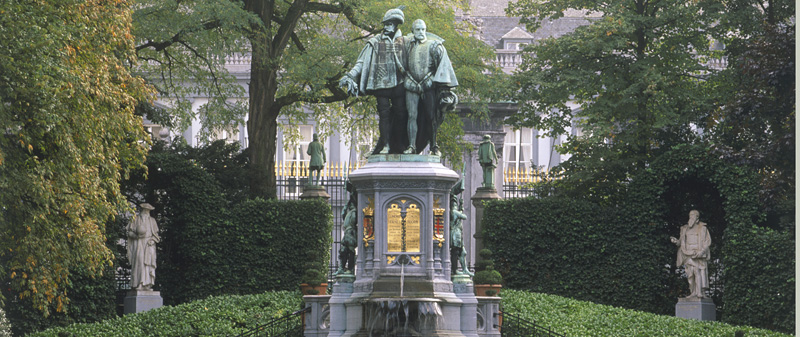 Moments in Belgian History
Moments in Belgian History
 50s BC: Julius Caesar
50s BC: Julius Caesar
The Roman army suffered repeated setbacks in its struggle against the courageous “Belgae”, but in the end Rome won out, and Belgium flourished under the Pax Romana of provincial rule for 400 years.
 AD 843: Treaty of Verdun
AD 843: Treaty of Verdun
After the Romans came the Franks, whose empire reached its apogee under Charlemagne. After his death, his homeland was split by treaty along the River Scheldt – the division from which Flanders and Wallonia would evolve.
 1302: Battle of the Golden Spurs
1302: Battle of the Golden Spurs
France dominated Flanders for much of the medieval period, eventually resulting in popular revolt. At the Battle of the Golden Spurs, a Flemish rebel force humiliated the cream of the French army.
 1384: Burgundy takes over
1384: Burgundy takes over

Philip the Good after Rogier van der Weyden
When Louis de Male, Count of Flanders, died in 1384, his title was inherited by his son-in-law Philip the Bold (1342–1404), Duke of Burgundy. The powerful dukes of Burgundy gradually extended their control over the Low Countries. Burgundian rule reached a Golden Age under Philip the Good (reigned 1419–67). Bruges, his capital, was the centre of a rich trading empire.
 1568: Religious strife
1568: Religious strife

Counts Egmont and Hoorn, Place du Petit Sablon, Brussels
Charles V, Holy Roman Emperor and King of Spain, inherited the Burgundian territories, but faced violent opposition there as Protestantism gathered pace. A decisive moment came in 1568, during the reign of Philip II, when Counts Egmont and Hoorn were executed in the Grand Place for opposing the persecution of Protestants. Eventually the territory was divided into Protestant north (the Netherlands) and Catholic south (now Belgium).
 1815: Battle of Waterloo
1815: Battle of Waterloo
When the Spanish Netherlands passed to Austria in 1713, conservative groups began to agitate for Belgian independence. Their revolt was swept aside in 1794 when the French revolutionary armies invaded. The Belgians were divided over the merits of Napoleonic rule, and fought on both sides when Napoleon was finally defeated by the Allies at Waterloo.
 1830: The Belgian Revolution
1830: The Belgian Revolution
After Waterloo, the Congress of Vienna placed Belgium under Dutch rule, a deeply unpopular solution. Anger boiled over in 1830, independence was declared, and the Dutch army was forced out of Brussels.
 1914–18: World War I
1914–18: World War I
At the outbreak of World War I, the German army swept into neutral Belgium. The Belgians thwarted their advance by flooding the land. The front settled near the medieval town of Ypres. Over the next four years, half a million people from both sides died there.
 1940–44: World War II
1940–44: World War II
History was repeated in May 1940, when the German army launched a Blitzkrieg against neutral Belgium to outflank the Maginot Line, which blocked their entry into France. Brussels was liberated in September 1944.
 1957: Treaty of Rome
1957: Treaty of Rome
Having been unwitting victims of two World Wars, the Belgians were enthusiastic supporters of the Treaty of Rome, which laid the foundations for the European Union. Over time, Brussels has effectively become the “Capital of Europe”.
